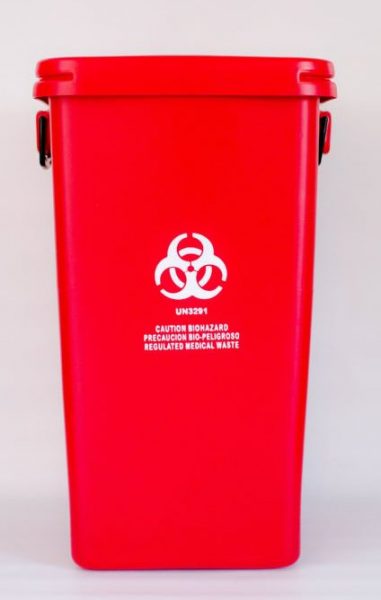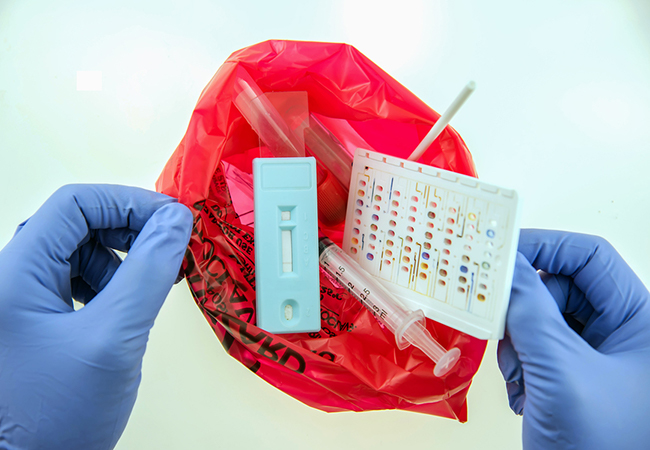Stay Ahead of Laws: Professional Suggestions on Medical Garbage Disposal
In a world where the health care market is constantly developing, it is important for medical centers to remain in advance of policies when it pertains to the correct disposal of clinical waste. With rigorous standards and frequent regulative modifications, it can be challenging to navigate the complexities of this process. With experienced suggestions, centers can ensure compliance and mitigate threats linked with inappropriate waste disposal. From understanding the various categories of clinical waste to applying the appropriate collection and partition methods, this discussion will provide valuable understandings and actionable ideas to help facilities remain in advance of policies in the ever-changing landscape of clinical waste disposal.
Comprehending Clinical Waste Categories
Understanding medical waste classifications is vital for proper disposal and monitoring in health care centers. Medical waste describes any waste produced by medical care activities that might position a hazard to public health or the atmosphere. It is crucial to classify clinical waste accurately to guarantee its secure handling, treatment, transport, and disposal.
There are a number of categories of clinical waste that healthcare facilities need to be aware of. The most typical categories consist of transmittable waste, pathological waste, sharps waste, pharmaceutical waste, and chemical waste. Each group has specific guidelines and policies for its correct administration and disposal.
Pathological waste refers to human cells, body organs, or body components that call for special handling and disposal. Pharmaceutical waste comprises expired, extra, or infected medicines that require cautious handling and disposal.
Staying Up-To-Date With Regulatory Changes
Staying current with regulatory changes is essential for healthcare facilities to make certain conformity and appropriate management of clinical garbage disposal. medical waste removal service. With guidelines constantly advancing, it is crucial for medical care facilities to remain current to prevent penalties, penalties, and prospective harm to the environment and public wellness
To stay ahead of governing changes, health care centers must establish a system for monitoring and tracking updates. This can be done by signing up for governing newsletters, participating in workshops and meetings, and actively taking part in industry organizations. In addition, centers need to assign a personnel or team in charge of staying educated and disseminating details to appropriate stakeholders.
Regular interaction with regulatory companies is additionally essential. Medical care facilities must establish partnerships with local, state, and government companies to ensure they understand any adjustments in regulations that may affect their waste administration techniques. This can be done with routine conferences, participation in public comment periods, and aggressive engagement with regulative firms.
Moreover, health care centers ought to take into consideration partnering with waste administration companies that concentrate on medical garbage disposal (medical waste disposal services with WasteX). These companies are typically fluent in the current guidelines and can give guidance and support to guarantee conformity
Executing Appropriate Collection and Partition Techniques
To successfully take care of medical garbage disposal, health care centers have to establish proper collection and segregation methods in accordance with regulative standards. Carrying out these approaches makes certain the secure handling and disposal of possibly hazardous materials, safeguards the environment, and minimizes the risk of infections and injuries to medical care workers and the public.
Appropriate collection and partition techniques include the usage of marked containers and identifying systems. Health care facilities should provide plainly identified containers for different kinds of clinical waste, such as sharps, contagious waste, pharmaceutical waste, and non-hazardous waste. These containers must be color-coded and plainly marked to avoid confusion and advertise very easy identification.
Additionally, healthcare centers need to educate their personnel on the correct procedures for accumulating and setting apart medical waste. This consists of enlightening them on the different types of waste, the suitable containers to use, and the importance of adhering to laws and guidelines. Routine training sessions and correspondence course need to be carried out to ensure that employee continue to be updated on ideal methods.
Additionally, health care facilities need to establish a system for normal collection and disposal of medical waste. This might involve partnering with certified waste monitoring business that concentrate on medical garbage disposal. These companies will guarantee that the collected waste is carried and gotten rid of in conformity with regulatory needs.
Choosing the Right Disposal Techniques

Incineration is just one of one of the most common and effective techniques for disposing of certain kinds of clinical waste, such as pathological waste and sharps. It entails the regulated burning of waste at heats, reducing it to ash. Nevertheless, incineration can launch harmful pollutants right into the air and add to air contamination.

Other disposal methods consist of chemical treatment, microwave therapy, and landfilling. Chemical treatment entails using chemicals to counteract the waste and disinfect. Microwave therapy makes use of microwave power to heat and decontaminate the waste. Landfilling involves hiding medical waste disposal services with WasteX the waste in medical waste disposal services with WasteX a designated land fill area (medical waste disposal services with WasteX). Landfilling must be the last hotel due to the possible risk of contamination to soil and groundwater.
Ensuring Conformity Via Documentation and Training
After carefully considering the suitable disposal techniques for medical waste, health care facilities should guarantee compliance with policies and minimize environmental impact by executing effective documentation and training procedures. This action is crucial in maintaining a lasting and secure atmosphere for both health care workers and the public.

Training is just as essential in making certain compliance with policies. Medical care employees who deal with clinical waste ought to obtain appropriate training on waste segregation, managing, and disposal treatments. This training should cover topics such as the appropriate use find out here now individual protective devices, identification of various sorts of waste, and the correct disposal techniques for every waste group. By providing extensive training, health care centers can encourage their staff to make informed decisions and reduce the danger of incorrect waste disposal.
Verdict
Finally, remaining ahead of laws in clinical garbage disposal is essential for healthcare centers. medical waste removal near me. Recognizing the various categories of clinical waste, remaining updated with regulatory adjustments, carrying out appropriate collection and segregation approaches, picking the ideal disposal techniques, and guaranteeing compliance via paperwork and training are all important steps. By complying with these guidelines, medical care organizations can effectively take care of and dispose of medical waste in a secure and accountable manner
From comprehending the different categories of clinical waste to executing the appropriate collection and segregation methods, this conversation will certainly offer valuable understandings and workable ideas to assist centers remain in advance of regulations in the ever-changing landscape of clinical waste disposal. - medical waste disposal services with WasteX
The most typical groups consist of infectious waste, pathological waste, sharps waste, pharmaceutical waste, and chemical waste. Healthcare facilities must supply plainly identified containers for various kinds of clinical waste, such as sharps, transmittable waste, pharmaceutical waste, and non-hazardous waste. Medical care centers need to develop a comprehensive system to videotape and track all facets of clinical waste disposal, consisting of kinds of waste created, amounts, and disposal approaches made use of. Healthcare workers who handle medical waste should receive appropriate training on waste segregation, handling, and disposal procedures.